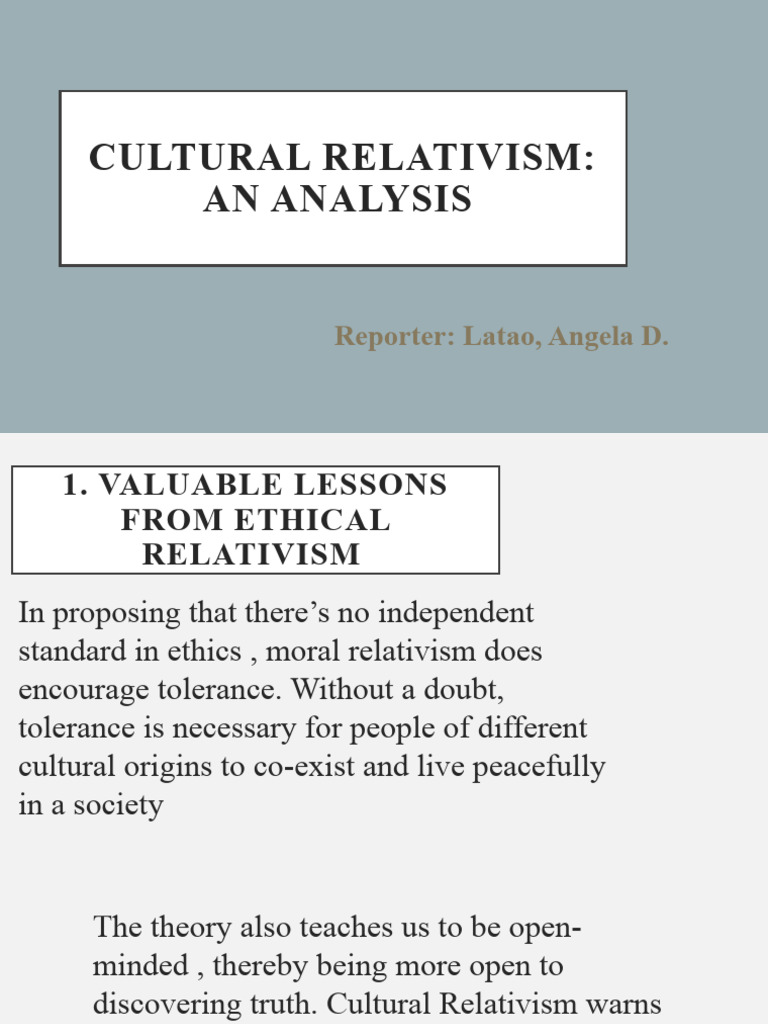Cultural relativism, a concept that posits that moral codes and ethical standards are contingent upon cultural contexts, has provoked myriad scholarly discussions and debates. There is a compelling argument that cultural relativism, despite its seemingly inclusive stance, is fundamentally untenable in the realm of ethics. This contention primarily hinges on several pivotal issues that will be systematically examined in the following sections.
To commence, it is vital to comprehend the foundational premise of cultural relativism. At its core, this doctrine suggests that what is considered morally right or wrong is intrinsically linked to specific cultural practices. Varied societies, therefore, articulate diverse ethical frameworks, each deserving recognition and respect. However, this assertion inherently raises a crucial question: if all ethical beliefs are equally valid, then how can one critique practices that are universally considered egregious?
One of the most significant challenges to cultural relativism lies in its inability to provide a robust framework for moral criticism. For instance, consider practices such as human trafficking, institutionalized racism, or gender-based violence. These abhorrent actions find justification in certain cultural contexts. If we adhere strictly to the tenets of cultural relativism, condemning such practices becomes extraordinarily complex; they are merely manifestations of different cultural norms. This leads to a moral paralysis where values cannot be universally upheld, thereby allowing for the proliferation of harm under the guise of cultural practices.
Moreover, cultural relativism is paradoxically self-defeating. If one posits that all cultural beliefs are equally valid, this belief itself must be granted the same status. Consequently, one cannot uphold cultural relativism without simultaneously undermining it. This internal contradiction highlights a fundamental flaw that detracts from its overall legitimacy. Philosophers argue that certain ethical standards may be universally applicable, transcending cultural boundaries. This perspective invokes the concept of human rights, which, though contentious in certain cultural discussions, posits that there exist certain inalienable rights that should be afforded to every individual, regardless of cultural context.
An additional critique of cultural relativism is its obscuring of moral progress. History is replete with examples where societal ethical understandings have evolved significantly. Consider the abolition of slavery, the progression towards gender equality, and contemporary movements advocating for LGBTQ+ rights. Each of these advancements emerged from critical evaluations of cultural norms that were, at one time, widely accepted. Cultural relativism would posit that these shifts are non-judgmental and subjective; yet, compelling moral reasoning can be employed to advocate for progress and critique oppressive systems. Failure to recognize this potential for moral evolution, therefore, limits our ethical landscape.
Furthermore, cultural relativism tends to overlook the intersectionality of cultures. In the modern context, many individuals identify with multiple cultures simultaneously. Globalization has rendered cultural exchanges commonplace, leading to a complex tapestry of ethical beliefs that can conflict and coalesce. In such an environment, where one culture might advocate for conservation and another for rapid industrialization, cultural relativism struggles to articulate a coherent ethical stance. This complexity signifies that not all cultural practices can be deemed equally valid; ethical discourse must instead engage with these variegated perspectives in a nuanced manner.
In addition, one must consider the implications of cultural relativism on policy-making and governance. If a nation adheres exclusively to the principle of cultural relativism, it might eschew international agreements on critical issues such as environmental protection, social justice, and humanitarian intervention. In our increasingly interconnected world, ethical standards that cross cultural lines are essential for collaborative efforts to combat global challenges like climate change. This necessitates a certain universality in ethical reasoning that cultural relativism inherently contradicts.
Moreover, while cultural relativism emphasizes the importance of understanding cultural contexts, it can lead to ethical complacency. A lack of critical engagement with one’s own cultural practices may perpetuate injustices or harmful traditions that warrant scrutiny. An uncritical acceptance of cultural norms can result in societies resisting necessary reform or failing to acknowledge injustices faced by marginalized groups. Consequently, this inertia proves antithetical to the pursuit of a more equitable and just society.
In conclusion, while cultural relativism offers a lens through which to appreciate cultural diversity, it falters as an ethical framework when confronted with the complexities of moral adjudication. Its inability to facilitate moral critique, inherent contradictions, neglect of moral evolution, disregard for cultural intersectionality, implications for policy-making, and potential for ethical complacency collectively render it unjustifiable. A more balanced approach to ethics might involve acknowledging distinct cultural practices while simultaneously advocating for universal principles that protect human dignity, promote justice, and seek meaningful progress. In our quest for a just world, we must not shy away from discerning the ethical implications of our cultural practices, striving instead for a moral landscape that upholds fundamental rights across cultural divides.
